Blog o automatizaci
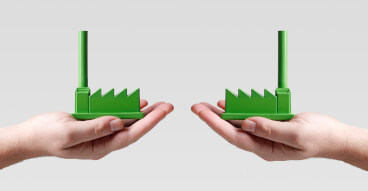
Green is key: sustainability in battery manufacturing for E-mobility
05. Únor 2020 Today, sustainability is no longer a niche topic, but something that companies are integrating into their business strategies. Not only are sustainability practices necessary to answer the changing demands of consumers, the marketplace and governments, they are also increasingly being seen as a competitive strength. That’s because sustainability practices reduce energy consumption and waste, and also help companies use their resources more efficiently. They even help companies optimize their manufacturing agility and enable them to respond to fluctuating demand and the growing need for personalization. And finally, sustainability can play an important role in acquiring and retaining customers, as well in developing new market opportunities.
The factory of the future: people and machines working together in harmony
20. Leden 2020 Automation and artificial intelligence (AI) are transforming the efficiency of industrial production, through stronger interactions between man and machine that can boost productivity. A new, promising model for ‘factory harmony’ is based on intelligent, integrated and interactive design for tomorrow's manufacturing processes.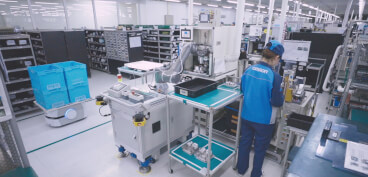
Humans and machine collaborate to meet today’s challenges
23. Prosinec 2019 In Shanghai, labour costs are increasing by 7% every year. With growing shortages in manpower, it is becoming more and more difficult to hire factory operators. On the other hand, companies must consider return on investment and equipment effectiveness when adopting automation solutions in the factory.
How industrial companies are catching up in the AI race
16. Prosinec 2019 Artificial intelligence (AI) is achieving breakthroughs in the industrial sector. McKinsey recently forecasted that the global market for AI-based services, software and hardware will grow by up to 25% annually and will be worth around US$130 billion by 2025. But AI also represents a major challenge for industries in Europe, which are lagging behind the US and China. So, how can we start putting AI into action? Predictive maintenance is one area that demonstrates its advantages and potential.
IoT security for manufacturers
11. Prosinec 2019 The Internet of Things (IoT) is a recent concept, involving the connection of devices that incorporate electronics, software or sensors, with the aim of collecting and exchanging data.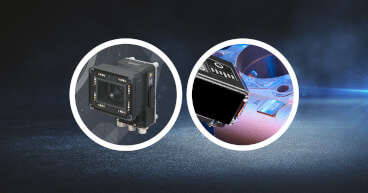
Six challenges for brand protection
19. Listopad 2019 Brand protection is an important topic for any business. But as industrial companies invest in new technology, such as smart robotics, artificial intelligence and vision systems, are they aware of the key challenges that could affect their brand?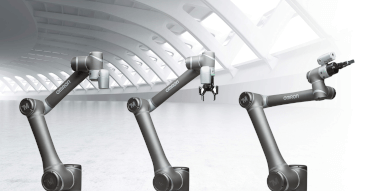
Three pillars of successful cobot deployment: safety, quality and flexibility from a single source
04. Listopad 2019 The use of collaborative robots is expected to increase rapidly in the next years to meet the needs of flexible production lines. To ensure that manufacturing layouts can be easily adapted to changing customer requirements, we recommend teaming up mobile robots and cobots. In addition, companies must consider integrated software apps and vision technology, as well as ensure support and risk assessment.
Smart machines: laying the golden egg?
16. Říjen 2019 Greater manufacturing efficiency: it’s the golden egg we’re all looking for. But it’s getting increasingly hard to find. The solution could be smarter automation, which involves lots and lots of data (‘big data’) and data collection and data-driven modelling. The smart machine then uses the models to automatically adjust its own behaviour (i.e. machine learning).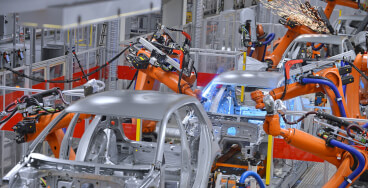
Legacy of machine vision
16. Říjen 2019 Did you know that for more than 40 years, Omron has developed vision sensing technologies for factory automation, surveillance and transport systems, and more recently for facial recognition and image processing for mobile phones, and even driver monitoring for autonomous driving?
Improve OEE with Artificial Intelligence at the Edge in Food Manufacturing
16. Říjen 2019 Implementation of Artificial Intelligence (AI) in food manufacturing is picking up speed. Many F&B companies are realizing that AI presents an opportunity to increase not only the Overall Equipment Effectiveness (OEE) – and therefore combine reduced costs with increased productivity – but also to improve the analysis of data to support continuous improvement programs such as reducing waste or process operations variability.
Late-stage customization in pharmaceutical manufacturing
16. Říjen 2019 As a result of serialization legislation, pharmaceutical manufacturers must now ensure that labels printed at a late stage contain all of the data required for compliance. This includes customizing product labels for certain markets, customers or products by adding variable data to labels or packaging. This avoids the need to stock individual packaging materials for each variant.